Ramadan--300x248.jpg" alt="It is the aloud recitation of the Arabic of the Quran with full understanding of its words, alone and in private, which moves my heart the most. (Foto: Onislam)" width="300" height="248" /> It is the aloud recitation of the Arabic of the Quran with full understanding of its words, alone and in private, which moves my heart the most. (Foto: Onislam)
by : Sadaf Farooqi*
How quickly we forget!
As we meander through life, living through our busy day-to-day schedules, it becomes normal for us to forget the good things that happened to us in the past; things that embodied the answer to ourdua’s to Allah, because of which our present is pleasant, and based on the occurrence of which, our future also looks promising.
I was recently revisiting memory lane, and wistfully recalling how I often used to sit with the Quran mushaf open in front of me in my late teens/early twenties, wishing with all my heart that I could decipher the Divine Arabic text directly, without needing to refer to a translation.
Also Read: The Forty-Four-Days of Glory: Azerbaijan’s Struggle for Justice and Peace
I remember feeling so frustrated that my eyes would well up with tears. To add insult to injury, the month of Ramadan always came during December-January throughout my 3-year undergraduate studies at college, which meant that I would spend the entire month either studying for, or giving, my end-of-semester exams.
However, the inner struggle to seek Allah and His guidance had already started in my soul during those 3 short years at college, and I recall how torn I’d feel, wanting to study the Quran in-depth during Ramadan, but being duty-bound and obligated to study my boring, 2-inch-thick textbooks about operating systems and digital computer design instead.
I would wish, oh so desperately, that I could instead study the Quran, in-depth and formally, instead of my comparatively dry and uninteresting software engineering books.
Little did I know how quickly Allah would answer my dua’s; how He would grant me knowledge that would let me understand the Arabic of the Quran directly, and how I would also be able to spend almost all my subsequent Ramadans, in close daily reflection upon the Quran.
Also Read: Palestine Solidarity Month: A Collective Movement for Al-Aqsa and Palestine’s Freedom
Allahu Akbar! Allah is truly the Greatest.
وَلَقَدْ مَكَّنَّاكُمْ فِي الْأَرْضِ وَجَعَلْنَا لَكُمْ فِيهَا مَعَايِشَ ۗ قَلِيلًا مَا تَشْكُرُونَ
And certainly We have established you in the earth and made in it means of livelihood for you; little it is that you give thanks.(QS: Al-A’raf : 10)
وَهُوَ الَّذِي أَنْشَأَ لَكُمُ السَّمْعَ وَالْأَبْصَارَ وَالْأَفْئِدَةَ ۚ قَلِيلًا مَا تَشْكُرُونَ
Also Read: Hassan al-Turabi: A Controversial Thinker from Sudan
And He it is Who made for you the ears and the eyes and the hearts; little is it that you give thanks. (QS: Al-Mu’minin : 78)
ثُمَّ سَوَّاهُ وَنَفَخَ فِيهِ مِنْ رُوحِهِ ۖ وَجَعَلَ لَكُمُ السَّمْعَ وَالْأَبْصَارَ وَالْأَفْئِدَةَ ۚ قَلِيلًا مَا تَشْكُرُونَ
Then He made him complete and breathed into him of His spirit, and made for you the ears and the eyes and the hearts; little is it that you give thanks. (QS: As-Sajadah: 9)
Realities of the Digital Age
Also Read: Who Exactly is the RSF Group Shaking Sudan?
Fast forward to my present life, 15 years later, and things couldn’t be more different (in a better way).
Even though Ramadan was more than two weeks away during this past month, I started to receive at least one email or digital message daily about the upcoming Ramadan Quran programs that were about to start in my online and geographical social circles.
Digital fliers and posters for Ramadan programs for children, youngsters, women, as well as men, started to be circulated round-the-clock.
Some programs were being held in the masajid during the nights of Ramadan (especially the ones for men), others would be conducted in the afternoons of Ramadan inside private homes, and still others would be held at religious educational institutes.
Also Read: The Two-State Solution (Palestine–Israel) in Historical Perspective
Many of them offered options of listening in live via smartphone, tablet or desktop computer/laptop, as well as that of tuning in to a playback of their recording through digital and social media later on in the day.
Instagram and Pinterest would publish almost daily, beautifully designed pictorial reminders about the approaching month of blessings. And Muslim portals, blogs and websites started to publish fresh content daily about how Muslims all around the world, from all walks of life, could prepare for and benefit from Ramadan.
Every Muslim was covered: there were tips and advice for children, teenagers, college students, young working professionals, housewives, working women, pregnant and breastfeeding mothers, as well as the senior, older generation.
Do we give enough thanks for living in the current digital age of ease, instant information, and knowledge that is available at-our-fingertips?
Also Read: Enchanted by K-Dramas, Dragged into Slander: Time for Muslims to Rise!
Full-Time Knowledge Pursuit: Privilege of Single Life
After graduating from college, I enrolled in a full-time Quran course, which aimed to teach me to eventually be able to decipher the Arabic text of the Quran directly, without needing a translation. After doing this 1.5 year-long course, I joined another small Hadith course, before rejoining the next 1.5 year long Quran program as a part-time teacher.
Whenever Ramadan would arrive during this beautiful 3-4 year period in my life that involved learning and teaching the Quran, I had the honor of attending a morning Quran program that took listeners through the short explanation of one juz’ of the Quran daily. At night, I would pray taraweeh in congregation, where the same juz’that I’d studied in the morning, would be repeated in the prayer.
It was one of the most beautiful phases of my life!
Also Read: Creating Opportunity and Avoiding Misery; Lesson Learn on Waste Recycling Issue
But, as stated by Allah in the verse of the Quran above, man gives little thanks.
I was very young, a full-time student of the Quran, involved day and night in working to propagate the message of Islam through whatever means were available to us back then, and spending one-on-one exclusive time at home with my parents in the evenings, but throughout this phase of my life, I was yearning for another blessing: I was praying to Allah to get me married as soon as possible, and to be granted children.
You see, one of the realities of human nature is that whenever a human being possesses a certain blessing, he wants and yearns for another one; one that he doesn’t have (yet).
And he only realizes the true worth and value of the blessings that he had, once they are gone.
Also Read: Between the Treaty of Hudaybiyyah and Ceasefire in Gaza
Adult Life: Reaping the Fruits of a Youth Spent in Studying the Quran
Any student of the Quran who assumes that he or she will be able to connect with the Quran as an older adult, the same way they did when they were single and childless, is probably going to be in for a surprise, especially if they are girls who want to get married and have children in the future.
Change is the only constant in life, and it spares nothing, not even the way in which we connect with the Quran as the years of our lives whiz past.
As a 36 year old mother-of-three today, I can only tearfully thank Allah for the multiple easy means available to me, via which He has facilitated my listening to, understanding, reading, studying, and pondering upon the Quran.
Also Read: Peace Cannot Be Achieved Without a Palestinian State
Because He granted me my dua’s of being able to understand the Arabic of the Quran directly, today I love reciting the Quran aloud every morning in Ramadan, alone and in privacy, the way Prophet Muhammad (peace be upon him) did with archangel Jibreel.
This private communion with Allah through the recitation of His Divine words every morning in Ramadan is one of the best ways yet, that I have been able to connect with the Quran.
After marriage and motherhood, the duties and obligations related to which leave me little exclusive time during the day for anything else, particularly for sitting down to attend an online class, or leaving the home to attend one, reciting the Quran with deep reflection in privacy, which is also a surefire sunnah of Prophet Muhammad during the month of Ramadan, seems to embody to me now, the sweet, succulent fruit of all those years of studying the Quran in-depth as a student, while I was young and single.
Conclusion: Appreciate the Quran Blessings of the Digital Age
Also Read: Facing the Wall: Netanyahu and Ambitions Built on Blood
Admittedly, I do not feel the same level of spiritual revitalization and rejuvenation by connecting to the Quran via other means now, e.g. by listening to an explanation of the translation of the Quran in another language, or by going through a short, abridged summary of each juz.
It is the aloud recitation of the Arabic of the Quran with full understanding of its words, alone and in private, which moves my heart the most, and allows me to be completely steeped in its guiding light (nur).
However, every Muslim in the world today, has their own unique need, ability, and capacity to connect with the Quran during the month of Ramadan. How much and in what manner they choose to do so, will vary according to their level of faith, religious commitment, practice of religious rituals, worldly occupation, age, time constraints, mental/physical health, amid other personal factors.
And, all praises to Allah, there is something out there for everyone today: be it an audio recording of a small portion of the explanation of the Quran uploaded, accessed and heard via Whatsapp every day, or a short talk on that day’s juz’ of the Quran availed during a mid-break in the nightly taraweeh prayers, the unity in diversity of the Muslim ummah becomes so beautifully apparent in the way in which each one of us chooses to reach out to Allah through the Quran during the month of Ramadan. (T/Imt/R03)
Mi’raj Islamic News Agency (MINA)
Source: On Islam





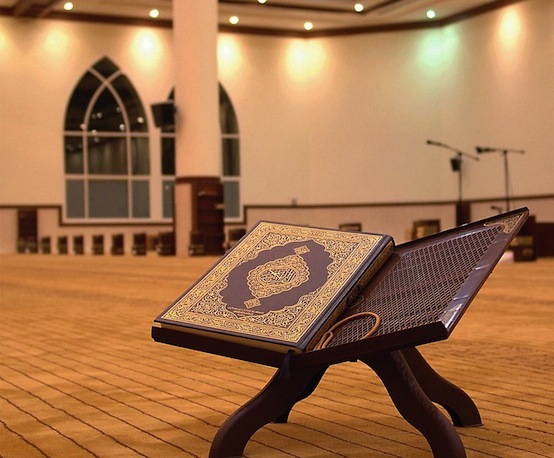





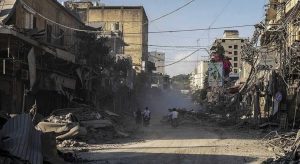
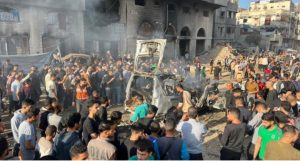

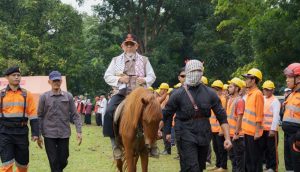

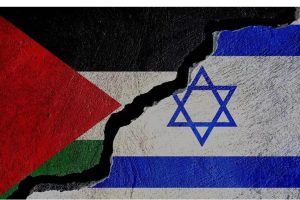

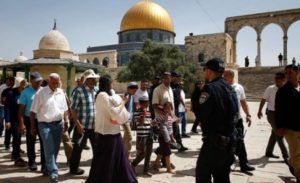

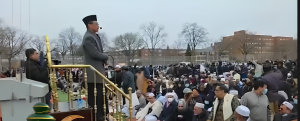














 Mina Indonesia
Mina Indonesia Mina Arabic
Mina Arabic